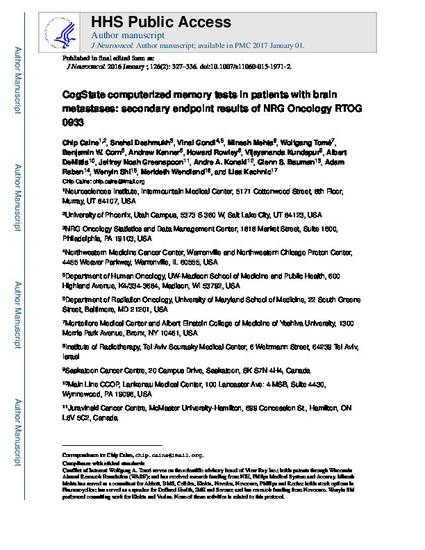
Whole brain radiotherapy (WBRT) is associated with memory dysfunction. As part of NRG Oncology RTOG 0933, a phase II study of WBRT for brain metastases that conformally avoided the hippocampal stem cell compartment (HA-WBRT), memory was assessed pre- and post-HA-WBRT using both traditional and computerized memory tests. We examined whether the computerized tests yielded similar findings and might serve as possible alternatives for assessment of memory in multi-institution clinical trials. Adult patients with brain metastases received HA-WBRT to 30 Gy in ten fractions and completed Hopkins Verbal Learning Test-Revised (HVLT-R), CogState International Shopping List Test (ISLT) and One Card Learning Test (OCLT), at baseline, 2 and 4 months. Tests' completion rates were 52-53 % at 2 months and 34-42 % at 4 months. All baseline correlations between HVLT-R and CogState tests were significant (p ≤ 0.003). At baseline, both CogState tests and one component of HVLT-R differentiated those who were alive at 6 months and those who had died (p ≤ 0.01). At 4 months, mean relative decline was 7.0 % for HVLT-R Delayed Recall and 18.0 % for ISLT Delayed Recall. OCLT showed an 8.0 % increase. A reliable change index found no significant changes from baseline to 2 and 4 months for ISLT Delayed Recall (z = -0.40, p = 0.34; z = -0.68, p = 0.25) or OCLT (z = 0.15, p = 0.56; z = 0.41, p = 0.66). Study findings support the possibility that hippocampal avoidance may be associated with preservation of memory test performance, and that these computerized tests also may be useful and valid memory assessments in multi-institution adult brain tumor trials.
Available at: http://works.bepress.com/minesh-mehta/349/

This article has been peer reviewed. It is the authors' final version prior to publication in Journal of Neuro-Oncology, Volume 126, Issue 2, January 2016, Pages 327-336.
The published version is available at https://doi.org/10.1007/s11060-015-1971-2 Copyright © Springer Science+Business Media New York